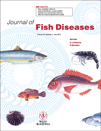
JOURNAL OF FISH DISEASES
Scope & Guideline
Exploring the depths of fish pathology and management.
Introduction
Aims and Scopes
- Disease Pathogenesis and Immunology:
Research articles examining the mechanisms of disease development in fish, including host-pathogen interactions, immune responses, and the genetic basis of resistance to diseases. - Diagnosis and Detection Methods:
Studies focused on developing and validating diagnostic techniques for fish diseases, including molecular assays, serological tests, and novel bioassays. - Environmental Impact on Fish Health:
Investigations into how environmental factors such as temperature, pollutants, and habitat changes affect fish health and disease susceptibility. - Pathogen Characterization and Management:
Research characterizing pathogens affecting fish, including bacteria, viruses, and parasites, and exploring management strategies to control their impact in aquaculture. - Aquaculture Health Management:
Articles discussing practices, treatments, and preventative measures to enhance fish health in aquaculture settings, including vaccination, probiotics, and dietary interventions. - Epidemiology and Disease Outbreaks:
Studies analyzing the epidemiology of fish diseases, including outbreak investigations, prevalence studies, and risk factor assessments.
Trending and Emerging
- Molecular and Genomic Approaches:
There is a growing trend towards utilizing molecular and genomic techniques to understand fish diseases better, including genomic sequencing of pathogens and transcriptomic analyses of host responses. - Sustainable Aquaculture Practices:
Research aimed at developing sustainable practices in aquaculture, such as the use of probiotics, natural compounds, and alternative feed sources, is gaining momentum in response to environmental and health concerns. - Climate Change Effects on Fish Diseases:
Studies investigating the impact of climate change on fish health and disease dynamics are becoming more prominent, highlighting the need for adaptive management strategies in aquaculture. - Pathogen Resistance and Biosecurity:
Emerging research focuses on understanding and enhancing fish resistance to diseases, as well as implementing biosecurity measures to prevent pathogen introduction and spread within aquaculture systems. - Integrated Health Management Strategies:
There is an increasing emphasis on integrated health management approaches that combine vaccination, nutrition, and environmental management to improve overall fish health and reduce disease outbreaks.
Declining or Waning
- Traditional Antibiotic Use:
Research related to the use of traditional antibiotics in aquaculture has decreased, as there is a growing emphasis on alternative treatments and sustainable practices, including the use of probiotics and phytochemicals. - Generalized Disease Reviews:
The frequency of broad reviews summarizing previously established fish diseases has waned, with a shift towards more focused and novel research that addresses specific pathogens or emerging diseases. - Morphological Studies Without Functional Implications:
Studies concentrating purely on the morphological aspects of fish diseases without linking to functional or ecological outcomes have become less prevalent, as there is a trend towards integrating functional research with morphological findings. - Non-Specific Pathogen Studies:
Research that does not specify the ecological or economic impact of pathogens on fish populations is declining, as the journal increasingly prioritizes studies with clear implications for fish health management.
Similar Journals
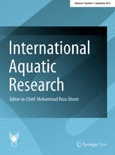
International Aquatic Research
Advancing aquatic knowledge for a sustainable future.International Aquatic Research, published by the Islamic Azad University, Tonekabon Branch, is a vital open-access journal dedicated to advancing the field of aquatic sciences since its inception in 2009. With an ISSN of 2008-4935 and an E-ISSN of 2008-6970, the journal plays a significant role in disseminating high-quality research findings from Iran and around the globe. It covers a broad range of topics in aquatic biology, fisheries science, and marine ecology, making it a valuable resource for researchers, professionals, and students alike. As of 2023, it ranks in the third quartile (Q3) of the aquatic science category with a Scopus rank of #138 out of 247 in Agricultural and Biological Sciences, reflecting its growing influence in the field. With a commitment to promoting scientific knowledge and fostering collaboration among aquatic research communities, International Aquatic Research is positioned as an essential platform for those dedicated to understanding and conserving marine and freshwater environments.

ISRAELI JOURNAL OF AQUACULTURE-BAMIDGEH
Fostering collaboration and knowledge in the aquaculture community.Welcome to the Israeli Journal of Aquaculture-Bamidgeh, published by AquacultureHub Inc, a pivotal platform dedicated to advancing the field of aquaculture studies since its inception in 1988. With a focus on innovative research and practical applications within the realms of Agronomy and Aquatic Sciences, this journal has established a reputation for disseminating high-quality findings that contribute to sustainable practices in aquatic farming. The journal, although classified in the Q3 and Q4 quartiles for its respective categories, offers valuable insights for researchers and practitioners alike, allowing them to stay abreast of developments in aquaculture challenges and solutions. While it's currently not an Open Access journal, the Israeli Journal of Aquaculture-Bamidgeh is committed to providing a thorough avenue for scholarly exchange and fostering collaborations across the global aquaculture community. Explore impactful studies and the latest trends to enhance your knowledge and research in this vital sector.
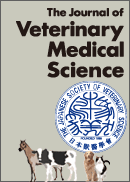
JOURNAL OF VETERINARY MEDICAL SCIENCE
Unlocking the Future of Veterinary Medicine Through Research.JOURNAL OF VETERINARY MEDICAL SCIENCE, published by the Japan Society of Veterinary Science, serves as a critical platform for advancing the field of veterinary medicine. With an ISSN of 0916-7250 and E-ISSN of 1347-7439, this journal covers a broad spectrum of topics relevant to veterinary science, publishing original research, reviews, and case studies that contribute to the scientific knowledge base and clinical practice. Recognized for its quality, the journal has achieved a Q2 ranking in the Veterinary (miscellaneous) category for 2023, placing it within the top 35% of journals in its field as per Scopus rankings. With a convergence of years spanning from 1991 to 2024, it reflects a rich history of scholarly contributions. Researchers, professionals, and students engaged in veterinary science will find valuable insights and advancements within its pages, significantly supporting their work and enhancing veterinary practices globally. The journal is located at the University of Tokyo, and while it does not currently offer open access, it remains an essential resource in veterinary medical literature.

FISHERIES SCIENCE
Bridging research and practice in fisheries management.Fisheries Science, published by Springer Japan KK, is a renowned journal in the field of aquatic science, effectively bridging the gap between scientific research and practical application in fisheries management. With an ISSN of 0919-9268 and an E-ISSN of 1444-2906, this journal serves as a vital resource for researchers, professionals, and students interested in advancing their knowledge and understanding of aquatic ecosystems and fishery practices. Operating within a competitive landscape, Fisheries Science has achieved a respectable ranking in Scopus, placing 96th out of 247 journals in the Agricultural and Biological Sciences > Aquatic Science category, showcasing its integral role in contributing to this dynamic field. The journal encompasses a wide range of topics from sustainable development to conservation strategies, aiming to foster collaborative research and innovative solutions to the challenges facing fisheries today. While not an open-access journal, Fisheries Science remains a key publication for those dedicated to marine science and the sustainable management of aquatic resources, with a historical footprint extending from 1994 to 2024.
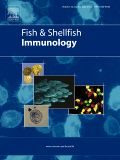
FISH & SHELLFISH IMMUNOLOGY
Connecting Ecology and Immunology for a Sustainable FutureFISH & SHELLFISH IMMUNOLOGY is a premier journal dedicated to advancing the understanding of immune responses in fish and shellfish, published by Academic Press Ltd - Elsevier Science Ltd. Since its inception in 1991, this journal has played a crucial role in disseminating cutting-edge research that intersects aquatic science, immunology, and environmental chemistry. With an impressive impact factor reflected by its 2023 rankings, it holds a Q1 quartile in Aquatic Science and Immunology, indicating its significant prestige and influence within the scientific community. The journal not only serves as a vital resource for researchers and professionals in the field but also reaches a broader audience interested in the ecological and health implications of aquatic immunology. Although it follows a subscription model, its extensive reach and high visibility within databases ensure that groundbreaking research and reviews are accessible to those interested in advancing knowledge in these interdisciplinary areas. With ongoing convergence towards 2024 and beyond, FISH & SHELLFISH IMMUNOLOGY remains a central platform for innovative studies that continue to shape the future of aquaculture and environmental sustainability.

FISH PHYSIOLOGY AND BIOCHEMISTRY
Illuminating Biochemical Pathways in Aquatic LifeFISH PHYSIOLOGY AND BIOCHEMISTRY, published by Springer, is a leading journal in the fields of aquatic science, biochemistry, and physiology, with an impressive trajectory since its inception in 1986 and continuing through 2024. Operating from the Netherlands, this journal serves as a vital platform for researchers, professionals, and students alike, showcasing innovative studies that explore the physiological and biochemical aspects of fish, contributing significantly to our understanding of aquatic ecosystems and their inhabitants. With a robust impact factor reflected in its Q1 status in Aquatic Science and notable rankings in other relevant categories, FISH PHYSIOLOGY AND BIOCHEMISTRY maintains a strong scholarly influence, evidenced by its Scopus ranking within the top quartiles of various biological sciences disciplines. While the journal does not currently offer open access options, it remains a cornerstone for advancing knowledge and fostering collaboration within the community dedicated to aquatic biology and related fields.
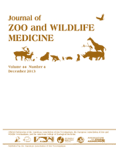
JOURNAL OF ZOO AND WILDLIFE MEDICINE
Fostering collaboration for a healthier planet's wildlife.JOURNAL OF ZOO AND WILDLIFE MEDICINE, published by the American Association of Zoo Veterinarians, serves as a pivotal resource in the field of veterinary science, focusing specifically on the health and well-being of zoo and wildlife species. With an ISSN of 1042-7260 and an E-ISSN of 1937-2825, this journal is recognized for its significant contributions to animal science and has been categorized in the second quartile in both Animal Science and Zoology, as well as Veterinary disciplines, according to the latest rankings. It holds a respectable position within Scopus, being ranked #91 in General Veterinary and #290 in Animal Science and Zoology. While the journal operates on a subscription basis, its impactful research articles have been invaluable for clinicians, researchers, and students alike, providing crucial insights that advance wildlife conservation, veterinary practices, and animal health care from 1993 to the present. With a global reach and a targeted focus on both theoretical and practical applications, JOURNAL OF ZOO AND WILDLIFE MEDICINE is instrumental in fostering collaboration among professionals dedicated to the study and care of wild animal populations.

Turkish Journal of Fisheries and Aquatic Sciences
Pioneering insights for the preservation of aquatic resources.Turkish Journal of Fisheries and Aquatic Sciences, published by the CENTRAL FISHERIES RESEARCH INST, is a key resource in the fields of Fisheries and Aquatic Sciences, catering to a global community of researchers and professionals. With its ISSN 1303-2712 and E-ISSN 2149-181X, this journal offers an engaging platform for the dissemination of high-quality research from Turkey, covering critical topics within Animal Science and Aquatic Science. As a third quartile journal in both categories (Q3, 2023), it provides valuable insights, contributing to a growing body of literature that addresses aquatic ecosystems, fisheries management, and biodiversity conservation, thereby enhancing the sustainability of aquatic resources. The journal has shown considerable impact, ranking 144th in Animal Science & Zoology and 116th in Aquatic Science within Scopus, reflecting its relevance and credibility within the academic community. Operating from 2008 to 2024, it invites open access submissions to foster collaboration and knowledge sharing among scientists, students, and practitioners alike, reinforcing its dedication to advancing the science of aquatic ecosystems.
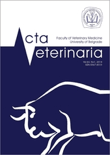
ACTA VETERINARIA-BEOGRAD
Exploring the frontiers of veterinary science.ACTA VETERINARIA-BEOGRAD is a distinguished academic journal dedicated to the field of veterinary science, focusing on a broad spectrum of topics pertinent to veterinary medicine and animal health. Published by SCIENDO, this journal has been an open-access resource since 2014, facilitating the dissemination of valuable research findings and innovations to a global audience. With an ISSN of 0567-8315 and an E-ISSN of 1820-7448, it plays a critical role in promoting accessible knowledge in veterinary practices while contributing to the advancement of the field. Located in Poland, this journal notably ranks in the Q3 quartile for veterinary studies, reflecting its ongoing commitment to quality and relevance. The journal welcomes contributions from a diverse range of veterinary disciplines, making it a vital platform for researchers, practitioners, and students alike who aspire to advance their understanding and impact within the veterinary community.
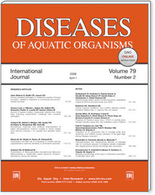
DISEASES OF AQUATIC ORGANISMS
Pioneering Research on Aquatic Organism DiseasesDiseases of Aquatic Organisms, published by Inter-Research in Germany, is a prominent academic journal with a focus on the study and management of diseases affecting aquatic organisms, including fish, mollusks, and corals. Since its inception in 1990, this journal has been a vital resource for researchers and professionals in the fields of aquatic science and ecology, evidenced by its Q2 ranking in both categories for 2023. With an ISSN of 0177-5103 and E-ISSN 1616-1580, it offers valuable insights and advancements in the understanding of aquatic health issues and their ecological implications. Though not an open-access journal, it maintains rigorous academic standards and fosters an international dialogue on emerging pathogens and their management, contributing significantly to the body of knowledge that informs sustainable practices in aquatic environments. As the field continues to evolve, Diseases of Aquatic Organisms remains a cornerstone for those dedicated to the preservation and study of aquatic biodiversity and ecosystem health.